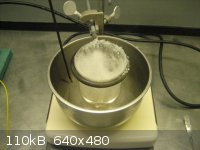Brominator
Harmless

Posts: 14
Registered: 21-2-2012
Location: United Kingdom
Member Is Offline
Mood: No Mood
|
|
phthalic acid -> phthalic anhydride
Would it be possible to dehydrate phthalic acid to phthalic anydride via sulphuric acid as the dehydrating agent,
I have no refrences for this hense why it is in beginnings,
i know that sulphuric acid does not carbonise the phthalic acid and i have thought up a possible mechanism for the reaction and was woundering if
anybody else could shed some light on the subject
Thank you
|
|
|
Hexavalent
International Hazard
    
Posts: 1564
Registered: 29-12-2011
Location: Wales, UK
Member Is Offline
Mood: Pericyclic
|
|
Watch this; http://www.youtube.com/watch?v=58Ve69s0qD0
"Success is going from failure to failure without loss of enthusiasm." Winston Churchill
|
|
|
Brominator
Harmless

Posts: 14
Registered: 21-2-2012
Location: United Kingdom
Member Is Offline
Mood: No Mood
|
|
I've seen nurdrages video and i know phthalic acid can be dehydrated using heat i was wondering if sulphuric acid could be used more out of interest
that practicality 
|
|
|
AirCowPeaCock
Hazard to Others
  
Posts: 311
Registered: 9-1-2012
Location: In your nation!
Member Is Offline
Mood: Hazardous
|
|
Try it, with just a little, id like to know if it works too
[Edited on 3-6-2012 by AirCowPeaCock]
BOLD
|
|
|
ItalianChemist
Hazard to Others
  
Posts: 172
Registered: 26-1-2011
Location: Italy
Member Is Offline
Mood: No Mood
|
|
Try dissolving phthalic acid in hot sulphuric acid, let it cool down to room temperature and then pour the solution in water slowly!
phthalic anhydride should precipitate out!
|
|
|
Brominator
Harmless

Posts: 14
Registered: 21-2-2012
Location: United Kingdom
Member Is Offline
Mood: No Mood
|
|
Surely the phthalic anhydride will simply hydrolyse in the water converting back to phthalic acid which won't be of much help ?
|
|
|
AirCowPeaCock
Hazard to Others
  
Posts: 311
Registered: 9-1-2012
Location: In your nation!
Member Is Offline
Mood: Hazardous
|
|
Phthalic anhydride should hydrolize rather slowly at room temperature.
Although, correct me if I'm wrong the sulfuric acid may speed that process up.
[Edited on 3-6-2012 by AirCowPeaCock]
BOLD
|
|
|
entropy51
Gone, but not forgotten
    
Posts: 1612
Registered: 30-5-2009
Member Is Offline
Mood: Fissile
|
|
Quote: Originally posted by Brominator  | I've seen nurdrages video and i know phthalic acid can be dehydrated using heat i was wondering if sulphuric acid could be used more out of interest
that practicality  |
In additon to the
video, Magpie has posted a very straight forward method: Quote: Originally posted by Magpie  | Having given up on being able to get phthalic anhydride (PAN) from suppliers (they send me phthalic acid [PA] instead), I have developed a reasonably
facile procedure for converting PA to PAN:
In a hood or outside:
Place 25g of the PA in a 250 mL beaker supported by an iron ring attached to a ringstand. Place the beaker in an oil bath so that the PA is heated by
the oil. Set the bath temperature at 200C. As the PA is heated above its mp (191C) PAN and water will vaporize. Some of the PAN will be lost to the
atmosphere and some will accumulate as fine needles in a wool along the sides of the beaker. Gather the wool as it is generated and drop it back into
the melt. Continue this until the melt has turned from milky white to clear. Then pour the melt into an evaporating dish and place in a dessicator
to cool. When cooled scrape out the melt and grind to a powder with a mortar and pestle. Yield = 82%.
I have done this twice. Both times the mp of the resulting PAN was 131.5-132.0C, as it should be. |
|
|
|
Magpie
lab constructor
    
Posts: 5939
Registered: 1-11-2003
Location: USA
Member Is Offline
Mood: Chemistry: the subtle science.
|
|

The single most important condition for a successful synthesis is good mixing - Nicodem
|
|
|
UnintentionalChaos
International Hazard
    
Posts: 1454
Registered: 9-12-2006
Location: Mars
Member Is Offline
Mood: Nucleophilic
|
|
Sulfuric acid merely dissolves phthalic acid by protonating it, I believe. The anhydride does not form this way.
Department of Redundancy Department - Now with paperwork!
'In organic synthesis, we call decomposition products "crap", however this is not a IUPAC approved nomenclature.' -Nicodem
|
|
|
Brominator
Harmless

Posts: 14
Registered: 21-2-2012
Location: United Kingdom
Member Is Offline
Mood: No Mood
|
|
I heated phthalic acid in conc sulphuric acid to get it to dissolve and then kept at this heat for 30 minutes i then slowly let it cool then cooled it
in an ice bath and needle like crystals of what i think are phthalic anhydride crystallized out.
i will now try magpies method to achieve a bulk amount of phthalic anhydrise
Thanks
|
|
|
bfesser
Resident Wikipedian
    
Posts: 2114
Registered: 29-1-2008
Member Is Offline
Mood: No Mood
|
|
In my experience the the 1,2-dicarboxylic acid tends to form platelets whereas phthalic anhydride tends to form needles when crystallizing out of
solution. Therefore, I concur that your product is likely the anhydride. Also, from experience, the anhydride has a repulsive odor while the pure
acid is typically odorless. Why would you want to waste sulfuric acid on this, however, is beyond me. The conversion requires nothing but heat and
patience--it's one of the most trivial preparations imaginable.
In fact, I've converted some of my phthalic anhydride from Chemsavers Inc. (fairly poor quality, probably technical grade) into the dicarboxylic acid,
to increase purity and eliminate the stink--also the anhydride tends to get 'static-y' where the acid does not. My thoughts were; why work with the
anhydride in situations where the acid is sufficient? And, the lower vapor pressure of the acid should help to minimize inhalation exposure.
[Edited on 3/8/12 by bfesser]
|
|
|
ScienceSquirrel
|
Thread Pruned
13-3-2012 at 05:19 |